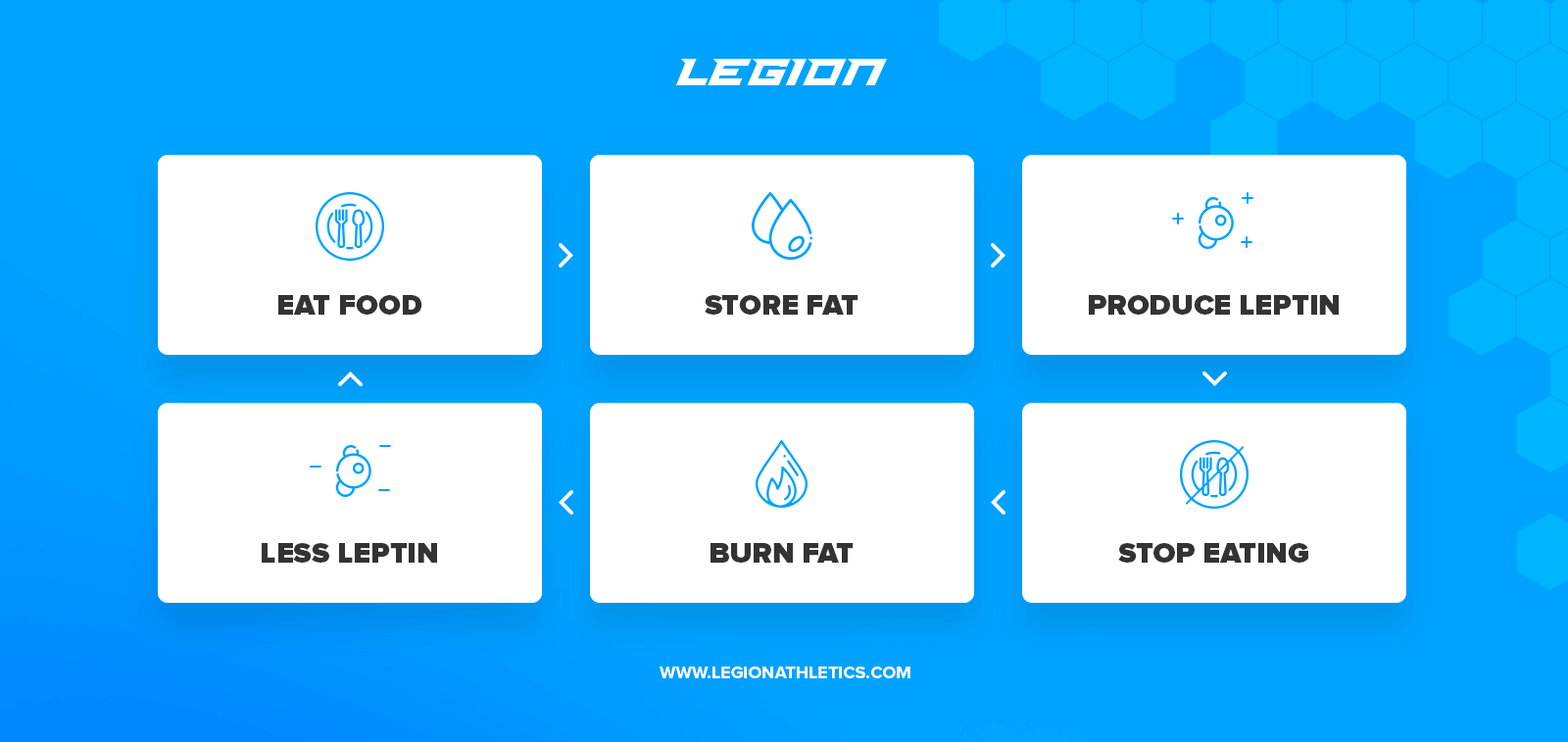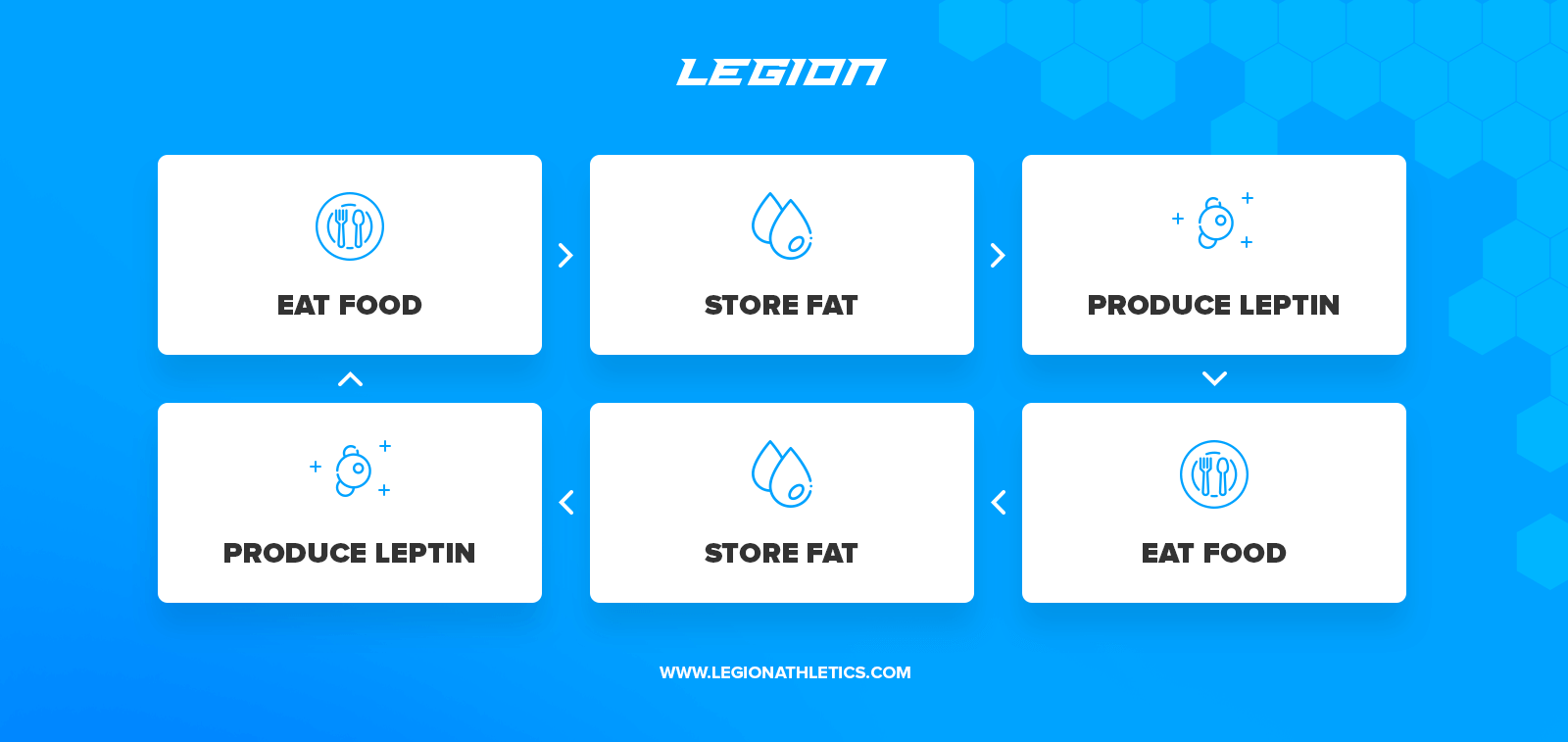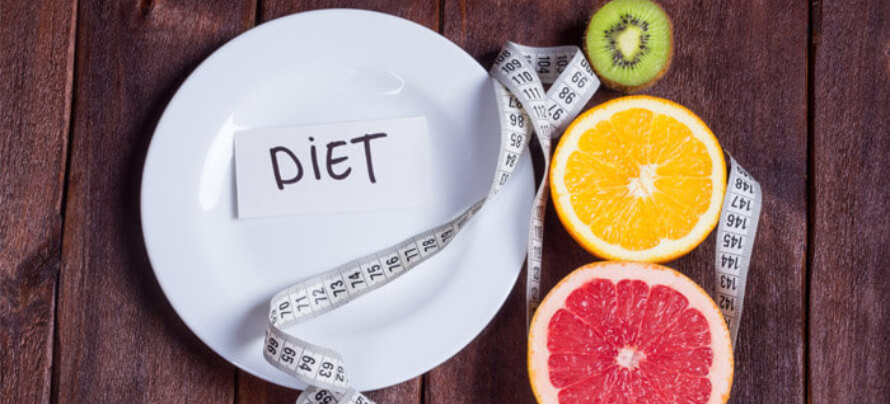Key Takeaways
- Leptin is a hormone primarily produced by fat cells that’s involved in many functions in the body including regulating appetite, metabolic rate, motivation, immunity, fertility, and libido, to name a few.
- Leptin resistance occurs due to being overweight, when the body no longer responds to the effects of leptin.
- Keep reading to learn the best ways to improve leptin sensitivity and weight loss!
If you’ve ever followed a weight loss diet, you know that losing weight is easiest at the beginning and becomes progressively more difficult the leaner you get.
Here’s a paradoxical corollary you may have also noticed:
If you’ve ever been overweight (or talked with people who have), you know that it’s easy to keep gaining weight even when you have a high body fat percentage.
Why?
Why does the body rebel against weight loss so forcefully, and welcome weight gain so readily?
Well, the answer to this puzzle largely lies with a hormone called leptin.
Leptin lies at the center of the constellation of problems every dieter experiences as they lose fat—lethargy, hunger, metabolic slowdown, and even increased risk of illness.
Just as low leptin levels can cause problems with weight loss, excessively high leptin levels can also be problematic. When leptin levels remain elevated for too long, you can become leptin resistant, which creates its own issues (more on this in a moment).
In the past decade a new wave of Internet doctors, fitness gurus, and online influencers have seized on the significance of leptin and come up with specialized diets and supplements designed to “hack” weight loss by controlling leptin.
They bowl people over with big, sciency words, but in the end their recommendations are all smoke and mirrors.
There’s no such thing as “hacking” your metabolism, leptin levels, or body fat, though, and controlling leptin isn’t the secret to weight loss any more than controlling other hormones like insulin or testosterone is.
Now for the good news:
Understanding how leptin works can give you a better perspective on what’s going on inside your body as you lose weight and how to make fat loss easier by making a few simple modifications to your diet.
Let’s start by looking at what leptin is.
(Or if you’d prefer to skip all of the scientific mumbo jumbo, and you just want to know how many calories, how much of each macronutrient, and which foods you should eat to lose weight, no problem! Just take the Legion Diet Quiz, and in less than a minute, you’ll know exactly what diet is right for you. Click here to check it out.)
What Is Leptin?
Leptin is a hormone primarily produced by fat cells that’s involved in many functions in the body including regulating appetite, metabolic rate, motivation, immunity, fertility, and libido, to name a few.
Leptin’s main job, though, is to help you maintain a healthy body weight.
It does this by keeping your brain informed as to how much energy is available in the form of body fat and calories from your diet.
When leptin levels are high, this tells your brain you have plenty of energy available in the form of stored body fat and dietary calories. The brain responds by reducing hunger and increasing metabolically expensive activities like muscle growth, sex, pregnancy, and exercise.
When leptin levels are low, though, this tells your brain your body fat stores and calorie intake are scarce. The brain responds by increasing hunger and decreasing “spending” on the aforementioned activities.
This manifests itself in the form of lethargy, lack of motivation, and the general malaise you feel when cutting calories.
In other words, low leptin levels are largely responsible for the negative feelings you experience when dieting.
Here’s how the process works in a nutshell:

In healthy humans, this “feedback” loop works incredibly well and helps us maintain healthy levels of body fat.
We get hungry, we eat until our body tells us its satisfied, it stores some of the food as fat and uses some for energy, we go about our day, expending energy and burning fat, our body tells us it needs more energy, we eat until satisfied, and the cycle repeats.
In this way, our body is normally able to maintain our weight in a very narrow range, never allowing us to gain or lose too much fat.
As you can see, leptin plays a key role regulating body weight—helping us consume enough energy to stay healthy, happy, and vibrant, while keeping us from eating so much that we become the opposite.
At this point you may be wondering, if that’s true, then how do people ever become overweight?
Why isn’t leptin keeping them from overeating?
Let’s find out.
How Does Leptin Affect Weight Loss?
To understand how leptin affects weight loss, you have to understand how leptin levels rise and fall in response to your diet and body composition.
Leptin levels in the body ebb and flow in relation to two variables:
- Your daily calorie intake.
- Your body fat levels.
When you’re eating enough calories to maintain or gain weight, fat cells secrete leptin to signal your brain that you have enough energy. As you learned a moment ago, this triggers the brain to decrease hunger and increase activity levels and other calorically costly activities.
Leptin levels closely correlate with your food intake on an hourly basis, rising as soon as five hours after eating a meal. Leptin levels are also particularly sensitive to carbohydrate-rich foods, which produce the greatest rise in leptin.
Likewise, leptin levels can also fall within a matter of days after you begin restricting calories for weight loss. For example, in one study conducted by scientists at Washington University, obese people who ate 1,000 calories per day (creating a massive calorie deficit) experienced a 26% drop in leptin levels after 10 days.
Another study conducted by scientists at the University of Chicago found that a week of undereating (70% of total daily energy expenditure) decreased leptin levels by 30 to 50%.
Leptin also helps control appetite and activity levels over the long-term, too, by keeping the brain apprised of your total body fat levels.
Despite what many people think, body fat is more than just an ugly, greasy, encumbrance. It’s the body’s best way to store energy and insulate the body, and it’s protected us humans from famine and cold for thousands of years.
As a result, the body evolved an elegant and resilient system for keeping careful tabs on how much body fat it has on hand at any one time.
Body fat is the main organ that creates leptin, and so when body fat levels rise, leptin levels rise in lock step.
Conversely, when body fat levels fall, leptin levels fall as well.
In this way, the brain is able to monitor how much energy it has available at any one time—in the short term by using leptin to monitor calorie intake relative to expenditure, and in the long term by using leptin to monitor body fat levels.
Here’s where things get interesting.
Leptin not only tells the brain what’s going on, it also acts as a kind of master regulator for many of the other hormones involved in fat loss, muscle gain, mood, and hunger.
For example, when leptin levels drop, this affects a number of other hormones involved in appetite, fat burning, and energy expenditure:
- Thyroid hormone decreases, which reduces metabolic rate and fat burning
- Neuropeptide Y and agouti-related peptide rise, which increases appetite and fat storage and decreases metabolic rate
- Cocaine and amphetamine regulated transcript fall, which increases appetite
- Cholecystokinin, a hormone that increases fullness, stops working as effectively, which further raises appetite
- Ghrelin, one of the primary hormones responsible for stimulating hunger, skyrockets
Leptin also directly increases fat burning in muscle tissue. And when leptin levels fall, this additional boost in full body fat burning dries up as well.
What’s more, low leptin levels depress immune function, which is part of why people who are dieting get sick more often than people who are eating enough calories to maintain or gain weight.
When body fat levels get low enough, there’s almost no detectable leptin in the blood, which is why it’s almost impossible not to feel hungry, tired, and lethargic when you get extremely lean (typically around 8% body fat for men and 18% for women).
When people who’ve been dieting for a while get an injection of synthetic leptin, these symptoms disappear, their metabolic rate increases, and they lose weight faster.
So, why don’t obese people just get a shot of leptin to lose weight?
Well, scientists tried this and it turned into a colossal failure.
Why?
How can this fat-burning, energizing, invigorating hormone not produce massive weight loss in those with the most weight to lose?
Simple: people with lots of body fat have high leptin levels—far more than lean people.
This is why injecting them with leptin doesn’t make them lose weight. They already have sky-high leptin levels, and thus jacking it up even further doesn’t produce any additional benefits.
What’s going on here?
Why are obese people driven to eat so much? Why aren’t their brains—swimming in leptin—reducing hunger and increasing the desire to exercise?
Is this a glitch in the matrix?
The hitch in this case is something known as leptin resistance.
Summary: Leptin levels rise as calorie intake and body fat levels increase and vice versa. Although falling leptin levels makes it increasingly difficult to lose weight the leaner you get, most guys can maintain a body fat percentage of around 10 to 15% and most women can maintain a body fat percentage of around 20 to 22% without much difficulty.
How Leptin Resistance Makes Weight Loss More Difficult
Like insulin resistance, leptin resistance is a condition wherein the body becomes less sensitive to leptin’s signals, which wreaks havoc on the appetite and metabolism.
Scientists aren’t entirely sure why this occurs, but the fact is overweight people have extremely high leptin levels, but in many cases their brains still believe they’re running low on energy and take the actions mentioned earlier to increase energy intake and decrease output.
In this case, the system looks like this:

Despite being overweight, these people want to eat more and exercise less.
Now, if you’ve spent any time on the Internet reading about weight loss, you may have heard some people point to leptin resistance as proof that the “calories in vs. calories out” theory of weight loss is bunk.
Stop worrying about your calorie intake, they coo, optimize your hormones and metabolism and weight loss will take care of itself.
Nothing could be further from the truth.
The fact is leptin resistance simply helps us better understand why restricting calories is difficult and doesn’t always result in as much weight loss as we’d expect. It doesn’t change the fact that you still have to restrict calories to lose weight.
While scientists aren’t sure how or why leptin resistance occurs at the cellular level, they have a pretty clear idea of what lifestyle factors lead to leptin resistance, and thus what people can do to pull themselves out of this metabolic quagmire.
For one thing, the main factor that causes leptin resistance is simply allowing yourself to become overweight in the first place. The primary source of leptin is excess body fat, and maintaining healthy body fat levels is the best way to avoid leptin resistance.
So, what should people who are already overweight do to get out of this logjam?
Well, restricting calories and reducing body fat levels reduces leptin levels and improves leptin sensitivity.
This won’t be fun in the beginning, when the body is still resistant to leptin and sending out SOS signals for more calories ASAP, but this effect diminishes as leptin levels stabilize and the brain once more becomes sensitive to leptin’s effects.
If you’re in this boat, there’s another reason to take heart that you won’t have to deal with the nuisance of leptin resistance forever.
Remember that leptin scales both in response to short-term calorie restriction and long-term fat loss.
This is why there’s normally a rapid drop in leptin right after you start a diet—in response to reduced calories—and thereafter a gradual decrease in leptin as you whittle away your fat stores.
What this means is that while the first few weeks of a new diet might be extremely difficult, an experience many obese people can relate to, it becomes easier and easier as your body finds it’s normal, healthy leptin level.
Don’t believe me?
Here are a few examples of guys who were obese who achieved a healthy body fat percentage following the Bigger Leaner Stronger program who’ve stayed lean ever since, without steroids, dangerous fat loss drugs, or surgery:
And here are a few examples of women who’ve achieved the same following the Thinner Leaner Stronger program:
These people are testaments to the fact that as long as you’re willing to stick your diet out for a few months, you can achieve and maintain a healthy, attractive physique even if you’re currently overweight and wrestling with leptin resistance.
In other words, if you lose fat, keep it off, and maintain the right habits, you can at least partially reprogram your brain to maintain a lower body fat percentage, or what researchers call your “set point.”
You can learn more about that concept in this article:
How to Change Your Body Weight Set Point
Aside from losing weight, there are two other potential ways to improve leptin sensitivity.
First, it’s possible that eating a diet of minimally processed, satiating, bland foods may help dodge the normal rise in hunger that follows from crashing leptin levels. Basically, a plant-based, high-protein bodybuilder style diet.
For example, several studies have shown that eating more simple, bland, foods can help obese people lose massive amounts of weight in short order without experiencing hunger.
Whether this is because this kind of diet improved leptin sensitivity or simply reduced hunger through other means, this diet produced significant weight loss with almost none of the discomfort normally associated with low leptin levels.
Second, there’s also indirect evidence that exercise may improve leptin sensitivity. Endurance athletes—who tend to exercise more than anyone—generally have lower leptin levels than you’d expect based on their low levels of body fat, and don’t generally suffer from intractable hunger or other symptoms of low leptin.
It’s possible this is because their exercise regimen makes their bodies more sensitive to leptin, thus requiring less to get the benefits.
Even if exercise doesn’t improve leptin sensitivity, there’s strong evidence that it helps “fine tune” your appetite so that you’re more satisfied from meals and less likely to overeat (which is basically what leptin does).
In other words, the three best ways we currently know how to improve leptin sensitivity are to lose weight, eat a healthy, minimally processed, whole-foods diet, and exercise.
And what about supplementation?
Well, although some companies claim to have produced leptin hormone supplements or supplements that raise leptin, there’s no evidence for any of these products. You just can’t increase leptin levels with supplements.
As you learned a moment ago, your body’s system for regulating body weight, foot intake, and body fat levels is extremely powerful, and just about the only way to “hack” the system is to inject yourself with leptin (which is insanely expensive and unproven to be safe long term).
Summary: Leptin resistance occurs when you gain large amounts of body fat, which raises leptin levels, which causes your brain to become less responsive to leptin’s beneficial effects. The best way to improve leptin sensitivity is to reach a healthy body fat percentage.
How Can You Raise Leptin Levels for Easier Weight Loss?
If you’re overweight or even obese (you have a BMI over 30), then you don’t need to worry about raising leptin levels.
Focus on losing weight, eating healthy, and exercising, and your body fat and leptin levels will settle into a new, healthy, sustainable range.
What if you’re pushing the lower limits of leanness, though?
What if you’re a man looking to dip under 10% body fat or a woman looking to slim down to less than 20% body fat?
This is when the low-leptin gremlins come out to play, and why getting #shredded is so damn difficult.
Once your body fat falls below these points—10 to 12% for men and 20 to 22% for women—leptin levels bottom out, dropping to almost nothing in many cases.
This leads to unyielding hunger, constant lethargy, weak workouts, and frayed nerves. All too often, this period is punctuated by a blow-out binge that results in gaining back much of the fat that was lost and then some.
What to do about this problem?
Well, the first step is to simply acknowledge this period isn’t going to be fun. You aren’t going to feel like yourself most of the time. Your workouts are going to feel significantly harder than normal. You’ll probably feel tired, unglued, and grouchy much of the time.
Such is life when in a prolonged calorie deficit.
Understanding and accepting this reality is going to go a long way in helping you cope with the effects of low leptin levels.
Keep in mind that if you can stick it out till the end, you’ll feel like a new person when you switch back to maintenance calories.
The second step is to take planned breaks from your diet to periodically raise leptin levels. You can think of these diet breaks as pushing your head above water to take a breath before diving back into the depths of low-calorie dieting.
Over the long-term, leptin levels are dictated by your body fat levels, and there’s nothing you can do to increase your chronic leptin levels except gain body fat.
In the short-term, though, leptin levels are largely dictated by your calorie intake, specifically, your carbohydrate intake.
Overfeeding on fat has no effect on leptin levels, whereas eating carbs causes a significant spike in leptin levels that lasts for as long as you keep feeding your body plenty of carbs. It’s unclear what effect protein overfeeding has on leptin levels, but it’s likely insignificant.
The closest thing to a “hack” for your metabolism is to raise your calorie intake to maintenance for several days by eating more carbs. This temporarily raises leptin levels, which partially reverses some of the mental and physical side effects of dieting.
This strategy also replenishes glycogen levels, which results in better workout performance, and gives you an opportunity to enjoy more food for a few days.
You may be wondering if following a high-carb diet while staying in a deficit can “trick” your body into keeping leptin artificially elevated, but that’s not the case. Carbs only cause a significant boost in leptin levels if you’re eating as many or more calories than you burn.
While many people balk at the idea of taking a break from their diet and slowing down their progress, research shows this is probably more efficient in the long run.
A salient example of this comes from a study conducted by scientists at the University of Tasmania.
The scientists randomly split 51 overweight men into two groups:
- Group one followed a fat loss diet every day for 16 weeks.
- Group two followed a fat loss diet for two weeks, increased their calories to maintenance for two weeks, and repeated this process until they had spent a total of 16 weeks following the fat loss diet.
Aside from this change, both groups followed the same diet, which involved a 33% calorie deficit.
In other words, both groups spent the same amount of time in a calorie deficit (16 weeks), but one bit the bullet and did it all in one fell swoop, and the other took a two-week break after every two-week stint of dieting.
The results?
The group that took planned diet breaks every two weeks lost 31 pounds, whereas the group that didn’t take breaks only lost 18 pounds.
Both groups only lost about three pounds of lean mass (most of which was likely glycogen), but the group that took diet breaks experienced half as much of a drop in metabolic rate as the group that didn’t take diet breaks.
Another review study by a scientist at the University of Illinois supported these findings when they concluded that taking diet breaks is generally more effective for maintaining muscle mass while losing fat than continuous dieting.
You can read more about this diet break study here:
Research Review: Can “Cheating” on Your Diet Help You Lose Fat Faster?
There are probably two reasons the people in this study who took diet breaks lost more fat than those who didn’t:
- It was easier for them to stick to the diet. Chances are good many of the people in group one didn’t stick to their 33% calorie deficit every day of the study, or they would have lost more weight.
- The group that took diet breaks enjoyed a slight boost in leptin levels and metabolic rate, which helped them burn more calories and lose more weight.
Admittedly, the first point is probably more significant than the second, but that doesn’t change the fact that taking diet breaks did help improve fat loss on the whole.
You probably don’t need to take as much time off as these people did, though. A few days at maintenance every few weeks is likely all you need to get the benefits of a diet break without unnecessarily prolonging your cut.
It’s also not a good idea to take diet breaks much shorter than this, though.
Although many diet gurus recommend taking a one-day per week “cheat day” to raise leptin levels, this strategy is a bad idea for a few reasons:
1. While a single high-carb meal or high-carb day will raise leptin levels, this doesn’t keep leptin levels elevated long enough to reverse the negative effects of dieting.
You see, it takes several days for your brain to recognize the increase in leptin and “trust” that your body is no longer dieting, and then to raise metabolic rate and decrease hunger.
It’s possible that it may take as long as a week or two of eating at maintenance to increase leptin levels back to where they’d normally be if you weren’t dieting (although several days is enough to produce noticeable benefits).
2. Most “cheat days” involve binging on lots of highly palatable, high-calorie, high-fat foods, which is one of the best ways to sabotage your long-term fat loss success.
No, you won’t get fat by binging for a single day, but overeating high-fat foods does little or nothing to raise leptin levels. Many people, particularly those who’ve been dieting a while, can also eat enough in a single day to wipe out most of the progress from the previous week of dieting.
In the best case scenario, this strategy just makes it significantly harder to switch back to your diet when the binge is over.
While some people swear by their weekly uninhibited binges, one for one, the people I’ve met who followed this strategy later regretted it.
Most found themselves caught in a vicious cycle of crash dieting throughout the week, binging on as many foods as they could “get away” with on the weekend, and repeating the cycle until they finally decided to adopt a more sustainable approach.
Not only does this hinder your fat loss efforts and negatively affect your social life, it also can lead to the dreaded “skinny fat” look if repeated for long enough.
It’s okay to cheat on your diet from time to time, but you need to do it intelligently. Check out this article to learn how:
Do You Make These 5 Cheat Meal Mistakes?
With that word of warning out of the way, how should you set up a diet break?
Here’s what I recommend:
- Increase your calories to maintenance for two to three days, depending on how you feel. If you feel worn down, tired, and hungry, do three days. If you feel okay but ready for a break, do two days. Use this calculator to figure out what your maintenance calories should be on these days.
- Keep your protein and fat intake the same as they are on your low-calorie days, and raise your calories in the form of carbs. This means focusing predominantly on high-carb, low-protein and low-fat foods like fruit, rice, potatoes, pasta, oats, and bread. This usually works out to getting at least 50% of your calories from carbs.
- Include carbs at every meal throughout the day (or at least in the morning and evening) so that you’re sending a prolonged signal to the brain to raise leptin levels.
- Keep everything else about your diet the same—meal frequency, food choices, and so forth. This makes it much easier to transition back to your low-calorie diet afterward.
- If you wish, include one or two treats that you’ve been craving, but make sure you keep the portions small and more or less stick to your regular protein and fat macros.
Repeat this process once every month or so if you’re above 15% (men) or 25% (women) body fat, and once every one or two weeks as you dip below 10% (men) or 20% (women).
Summary: The best way to raise leptin levels while dieting is to take a two to three day diet, where you raise calories to maintenance by increasing your carb intake. Most people can benefit from this kind of diet break every 6 to 8 weeks or so, but you’re very lean and looking to get leaner you may take a diet break once every two or three weeks.
The Leptin Diet: Can You Raise Leptin and Lose Weight by Eating the Right Foods?

The leptin diet is a weight loss diet that gained popularity in the early 2000s—when leptin was just starting to go mainstream—that promised to help people lose weight by raising leptin levels.
The diet involves five rules:
- Never eat after dinner and don’t eat anything for at least three hours before bed time.
- Eat three meals per day without snacking, and separate meals by at least five to six hours.
- Reduce your carb intake, but don’t eliminate carbs completely.
- Eat relatively small meals. Stop eating when you feel satisfied, not when you feel full.
- Eat at least 20 to 30 grams of protein for breakfast.
You’re also generally supposed to eat fresh, organic fruits, vegetables, whole grains, and lean meats. Although you aren’t required to count calories, you’re encouraged to aim for around 400 to 600 calories per meal (which would provide around 1200 to 1800 calories per day).
In other words, it’s a collection of generic weight loss tips and diet restrictions packaged as a new, scientific diet that will help you lose weight by optimizing leptin levels.
If you follow the diet recommendations (particularly the calorie guidelines), you’ll probably lose weight, which will in turn improve your leptin sensitivity, but there’s no scientific evidence this particular combination of foods or food timing strategies will improve leptin levels or fight leptin resistance.
At bottom, it’s just a low-calorie, low-carb diet stamped with a buzzword to give it more popular appeal.
If you’re looking for a more enjoyable, sustainable, and effective weight loss diet, check out this article:
The Complete Guide to Safely and Healthily Losing Weight Fast
Summary: The leptin diet is just a low-calorie, low-carb diet that gives a new name to a handful of well-worn diet tips. Although it will likely help you lose weight, there are better weight loss diets such as the one outlined in this article.
The Bottom Line on Leptin
Leptin is a hormone primarily produced by fat cells that’s involved in many functions in the body including regulating appetite, metabolic rate, motivation, immunity, fertility, and libido, to name a few.
Leptin’s main job is to help you maintain a healthy body weight, and it does this by telling the brain how much total energy the body has available in the form of calories from food and body fat.
When leptin levels rise, hunger drops and metabolic rate, motivation to exercise, and mood improve.
When leptin levels drop, as happens when you restrict calories for fat loss, hunger rises and metabolic rate, motivation to exercise, and mood decrease.
Ironically, obese people have higher leptin levels than lean people. Due to a phenomenon known as leptin resistance, their brains perceive a shortage of calories in spite of high leptin levels, and increase hunger and decrease metabolic rate as a result.
The single best way to prevent leptin resistance is to not become overweight in the first place. If you’re already overweight, you can improve your leptin sensitivity by restricting your calorie intake, eating mostly whole, minimally processed, nutrient dense foods, and exercising regularly.
If you’re lean and looking to get even leaner (less than 10% body fat for a man and 20% body fat for a woman), then you’re going to experience the negative effects of low leptin at one point or another no matter what you do.
One trick you can do to temporarily boost leptin levels, though, is to increase your calorie intake for two to three days periodically throughout your diet, mostly in the form of carbs.
Do that, and you’ll have a much easier time losing fat, maintaining muscle while cutting, and staying lean when your diet is over.
The leptin diet promises to help you lose weight by boosting leptin levels, but it’s really just a low-calorie, low-carb diet with a handful of added restrictions and a new name. While it will help you lose weight, there’s no evidence it will improve leptin levels more effectively than other weight loss diets.
If you want to lose fat and keep it off without dealing with nagging hunger, cravings, and lethargy, I recommend you follow a diet like the one outlined in this article:
The Complete Guide to Safely and Healthily Losing Weight Fast
What’s your take on Leptin? Have anything else you’d like to share? Let me know in the comments below!
Scientific References +
- Olson BR, Cartledge T, Sebring N, Defensor R, Nieman L. Short-term fasting affects luteinizing hormone secretory dynamics but not reproductive function in normal-weight sedentary women. J Clin Endocrinol Metab. 1995;80(4):1187-1193. doi:10.1210/jcem.80.4.7714088
- Loucks AB, Verdun M. Slow restoration of LH pulsatility by refeeding in energetically disrupted women. Am J Physiol - Regul Integr Comp Physiol. 1998;275(4 44-4). doi:10.1152/ajpregu.1998.275.4.r1218
- Varady KA. Intermittent versus daily calorie restriction: Which diet regimen is more effective for weight loss? Obes Rev. 2011;12(7). doi:10.1111/j.1467-789X.2011.00873.x
- Byrne NM, Sainsbury A, King NA, Hills AP, Wood RE. Intermittent energy restriction improves weight loss efficiency in obese men: The MATADOR study. Int J Obes. 2018;42(2):129-138. doi:10.1038/ijo.2017.206
- Levine JA, Eberhardt NL, Jensen MD. Leptin Responses to Overfeeding: Relationship with Body Fat and Nonexercise Activity Thermogenesis 1. J Clin Endocrinol Metab. 1999;84(8):2751-2754. doi:10.1210/jcem.84.8.5910
- Dirlewanger M, Di Vetta V, Guenat E, et al. Effects of short-term carbohydrate or fat overfeeding on energy expenditure and plasma leptin concentrations in healthy female subjects. Int J Obes. 2000;24(11):1413-1418. doi:10.1038/sj.ijo.0801395
- Murgatroyd PR, Frühbeck G, Goldberg GR, et al. Leptin does not respond to 48h fat deposition or mobilization in women. Int J Obes. 2003;27(4):457-462. doi:10.1038/sj.ijo.0802252
- Trexler ET, Hirsch KR, Campbell BI, Smith-Ryan AE. Physiological changes following competition in male and female physique athletes: A pilot study. Int J Sport Nutr Exerc Metab. 2017;27(5):458-466. doi:10.1123/ijsnem.2017-0038
- Thackray AE, Deighton K, King JA, Stensel DJ. Exercise, appetite and weight control: Are there differences between men and women? Nutrients. 2016;8(9). doi:10.3390/nu8090583
- King NA, Caudwell PP, Hopkins M, Stubbs JR, Naslund E, Blundell JE. Dual-process action of exercise on appetite control: Increase in orexigenic drive but improvement in meal-induced satiety. Am J Clin Nutr. 2009;90(4):921-927. doi:10.3945/ajcn.2009.27706
- Voss SC, Nikolovski Z, Bourdon PC, Alsayrafi M, Schumacher YO. The effect of cumulative endurance exercise on leptin and adiponectin and their role as markers to monitor training load. Biol Sport. 2016;33(1):23-28. doi:10.5604/20831862.1180173
- Chu NF, Stampfer MJ, Spiegelman D, Rifai N, Hotamisligil GS, Rimm EB. Dietary and lifestyle factors in relation to plasma leptin concentrations among normal weight and overweight men. Int J Obes. 2001;25(1):106-114. doi:10.1038/sj.ijo.0801468
- Cabanac M, Rabe EF. Influence of a monotonous food on body weight regulation in humans. Physiol Behav. 1976;17(4):675-678. doi:10.1016/0031-9384(76)90168-2
- Hashim SA, Van Itallie TB. STUDIES IN NORMAL AND OBESE SUBJECTS WITH A MONITORED FOOD DISPENSING DEVICE. Ann N Y Acad Sci. 1965;131(1):654-661. doi:10.1111/j.1749-6632.1965.tb34828.x
- Keim NL, Stern JS, Havel PJ. Relation between circulating leptin concentrations and appetite during a prolonged, moderate energy deficit in women. Am J Clin Nutr. 1998;68(4):794-801. doi:10.1093/ajcn/68.4.794
- Hinkle W, Cordell M, Leibel R, Rosenbaum M, Hirsch J. Effects of Reduced Weight Maintenance and Leptin Repletion on Functional Connectivity of the Hypothalamus in Obese Humans. PLoS One. 2013;8(3). doi:10.1371/journal.pone.0059114
- Wing RR, Sinha MK, Considine R V., Lang W, Caro JF. Relationship between weight loss maintenance and changes in serum leptin levels. Horm Metab Res. 1996;28(12):698-703. doi:10.1055/s-2007-979881
- Myers MG, Heymsfield SB, Haft C, et al. Challenges and opportunities of defining clinical leptin resistance. Cell Metab. 2012;15(2):150-156. doi:10.1016/j.cmet.2012.01.002
- Considine R V., Sinha MK, Heiman ML, et al. Serum immunoreactive-leptin concentrations in normal-weight and obese humans. N Engl J Med. 1996;334(5):292-295. doi:10.1056/NEJM199602013340503
- Heymsfield SB, Greenberg AS, Fujioka K, et al. Recombinant leptin for weight loss in obese and lean adults: A randomized, controlled, dose-escalation trial. J Am Med Assoc. 1999;282(16):1568-1575. doi:10.1001/jama.282.16.1568
- Fogteloo AJ, Pijl H, Frölich M, McCamish M, Meinders AE. Effects of recombinant human leptin treatment as an adjunct of moderate energy restriction on body weight, resting energy expenditure and energy intake in obese humans. Diabetes, Nutr Metab - Clin Exp. 2003;16(2):109-114. https://www.ncbi.nlm.nih.gov/pubmed/12846450?ordinalpos=13&itool=EntrezSystem2.PEntrez.Pubmed.Pubmed_ResultsPanel.Pubmed_RVDocSum. Accessed January 23, 2020.
- Kelesidis T, Mantzoros CS. The emerging role of leptin in humans. Pediatr Endocrinol Rev. 2006;3(3):239-248. https://www.ncbi.nlm.nih.gov/pubmed/16639389?ordinalpos=9&itool=EntrezSystem2.PEntrez.Pubmed.Pubmed_ResultsPanel.Pubmed_RVDocSum. Accessed January 23, 2020.
- Venkatraman JT, Pendergast DR. Effect of dietary intake on immune function in athletes. Sport Med. 2002;32(5):323-337. doi:10.2165/00007256-200232050-00004
- Bernotiene E, Palmer G, Gabay C. The role of leptin in innate and adaptive immune responses. Arthritis Res Ther. 2006;8(5). doi:10.1186/ar2004
- Ceddia RB. Direct metabolic regulation in skeletal muscle and fat tissue by leptin: Implications for glucose and fatty acids homeostasis. Int J Obes. 2005;29(10):1175-1183. doi:10.1038/sj.ijo.0803025
- Wang L, Barachina MD, Martínez V, Wei JY, Taché Y. Synergistic interaction between CCK and leptin to regulate food intake. Regul Pept. 2000;92(1-3):79-85. doi:10.1016/s0167-0115(00)00153-1
- Hill JW, Elmquist JK, Elias CF. Hypothalamic pathways linking energy balance and reproduction. Am J Physiol - Endocrinol Metab. 2008;294(5). doi:10.1152/ajpendo.00670.2007
- Banks W. The Blood-Brain Barrier as a Cause of Obesity. Curr Pharm Des. 2008;14(16):1606-1614. doi:10.2174/138161208784705496
- Chin-Chance C, Polonsky KS, Schoeller DA. Twenty-Four-Hour Leptin Levels Respond to Cumulative Short-Term Energy Imbalance and Predict Subsequent Intake 1. J Clin Endocrinol Metab. 2000;85(8):2685-2691. doi:10.1210/jcem.85.8.6755
- Ostlund RE, Yang JW, Klein S, Gingerich R. Relation between plasma leptin concentration and body fat, gender, diet, age, and metabolic covariates. J Clin Endocrinol Metab. 1996;81(11):3909-3913. doi:10.1210/jcem.81.11.8923837
- Romon M, Lebel P, Velly C, Marecaux N, Fruchart JC, Dallongeville J. Leptin response to carbohydrate or fat meal and association with subsequent satiety and energy intake. Am J Physiol. 1999;277(5):E855-61. doi:10.1152/ajpendo.1999.277.5.E855
- Due A, Larsen TM, Mu H, et al. The effect of three different ad libitum diets for weight loss maintenance: a randomized 18-month trial. Eur J Nutr. 2017;56(2):727-738. doi:10.1007/s00394-015-1116-6
- Loucks AB. Energy availability and infertility. Curr Opin Endocrinol Diabetes Obes. 2007;14(6):470-474. doi:10.1097/MED.0b013e3282f1cb6a
- Hausman GJ, Barb CR. Adipose tissue and the reproductive axis: Biological aspects. Endocr Dev. 2010;19:31-44. doi:10.1159/000316895
- Dalamaga M, Chou SH, Shields K, Papageorgiou P, Polyzos SA, Mantzoros CS. Leptin at the intersection of neuroendocrinology and metabolism: Current evidence and therapeutic perspectives. Cell Metab. 2013;18(1):29-42. doi:10.1016/j.cmet.2013.05.010
- Davis JF. Adipostatic regulation of motivation and emotion. Discov Med. 2010;9(48):462-467. https://www.ncbi.nlm.nih.gov/pubmed/20515615. Accessed January 23, 2020.
- Friedman JM, Halaas JL. Leptin and the regulation of body weight in mammals. Nature. 1998;395(6704):763-770. doi:10.1038/27376
- Margetic S, Gazzola C, Pegg GG, Hill RA. Leptin: A review of its peripheral actions and interactions. Int J Obes. 2002;26(11):1407-1433. doi:10.1038/sj.ijo.0802142














